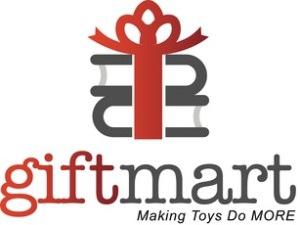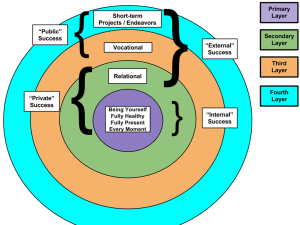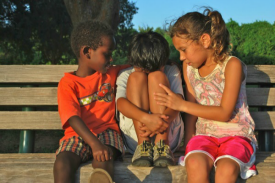My family just finished serving at an outreach event for the under-resourced in our local community called “Gift Mart.” It’s a great program that has well-resourced people buying new toys for kids, which are then sold at the local schools for a couple dollars each. This provides dignity for the people purchasing the gifts – as they get to select them and pay for them – and also provides more than $10,000 to local, under-resourced school districts. It’s a well thought out holiday outreach program and has been running for 13 years now.
The volunteer effort is pretty substantial. 700+ volunteers over several schools in the area. My family has always helped in the play rooms that are set up to help keep the young kids occupied so their parents can shop for gifts without their kids seeing them. Once the gifts are purchased, there are volunteers who wrap the gifts so they are hidden from the kids and all set to go under the tree.
My wife did the gift wrap this year with a bunch of her friends, and the rest of us worked with the kids again. We had an earlier shift with the kids so we finished up about halfway through the event. I went to touch base with my wife Vicky at the gift wrapping station. There were about a dozen stations, each with 6 or more people in line to get their gifts wrapped.
I greeted everyone waiting to get their gifts wrapped as a walked through the crowd to the back of the room to say hi to Vicky and her friends. As we were about to leave, I addressed the whole group of gift-wrappers, as they were all friends of Vicky’s, “If you all decide to go get something to eat after your shift is over, text me and I’ll meet up with you.”
Immediately after I said that, it hit me as I was walking out of the room, back through the crowd of people waiting for their gifts to be wrapped – If we go out to eat afterwards, it is very likely that we will EACH spend MORE on that one meal out, than these parents have spent in total for Christmas gifts for their kids (most had several kids).
Each family is limited to purchase seven gifts, at $2 each for a grand total of $14 per family. As I just said what I said, and reflected on it as I looked everyone in the eyes on my way out, I felt kind of ashamed. Like, if they understood what I was saying – most of them were Spanish speaking – then they could easily figure out how much disposable income we must have compared to them. I felt like I was kind of throwing it in their faces – albeit unintentionally.
Then, on the walk to the car and the subsequent drive home, I thought about it a little more. It’s really NOT FAIR that, I have the capacity to spend more money on an average lunch out, than most of these folks have available in total for Christmas gifts for their kids.
As I thought about it more, the real issue, isn’t that I am in a position to have more disposable income – the real issue is that these other folks are NOT in that position. And for most of them, the odds of any of them moving from their position to my position is relatively small – regardless of how hard they work.
I have always been in a position to be able to fully leverage the “system” of financial success in this country. In fact, that system has been designed by guys like me, and as an unintentional side-effect for the most part, it works best for guys like me – white, English-speaking “guys” born into strong, American family units with strong extended families – having grown up and gone to school in highly-resourced areas.
It’s easy to forget the root issue here – one of the main reasons the “Gift Mart” even exists – is that many people have not been able to fully leverage the system of success in this country. As such, they do not have access to the same resources that people like me do – and they need subsidized toys, or else they will have nothing to give to their kids. And the schools they attend need external help because their tax-base does not generate sufficient resources.
I’d like to make a few points here.
One, the world will always need some level of “relief” type support in terms of subsidies and sometimes even direct handouts. With the number of people in this country, and the myriad of issues that can affect people without a safety net of strong family support, we will always need relief, or aid-based assistance programs. So, “Gift Mart” provides a great and much needed service to the community and always will. Helping out, donating toys, volunteering, etc., at “Gift Mart” and similar services is a significant outreach and should not be cheapened because of the larger, more systemic issues at work.
Two, spending money is, for the most part, a good thing. If economic experts can agree on one thing, it is that what is called the “velocity of money,” or how often money changes hands, is directly related to financial health of economies. We want people with disposable income to spend it eating out, shopping, and on products and services. That spending provides jobs so people have more disposable incomes. Spending money going out to eat is not the primary cause of the income disparities in the country. It is actually a big part of the solution.
Three, I believe that many of the primary causes of the financial disparities in this country are systemic in nature. They are “system issues.” The systems are not designed to provide maximum opportunity for folks who do not match the “norm” for many existing Americans.
Inflation adjusted wages have not grown at least 30 years – at all. Prices for homes, rent, cars, food, even college and higher education have gone higher at a much more rapid pace the last 30 years. Without a strong foundation, it is very difficult to leverage the existing systems to GET BETTER – to improve your financial circumstances and generate disposable income.
Changing systems is difficult, complicated, and a process of long-suffering. Most everyday folk cannot get their head around how they can contribute to changing the system – and the truth is, most will never be able to invest a great deal of time in advocating for better systems.
What most folk can do, is help provide that solid foundation that the current system is predicated upon. Most people with some level of financial success have networks of coaching, mentoring, and short-term assistance in extended family and friends that can provide long-term wise-counsel and advice and short-term support when needed. Each of us is capable to inviting others who are less fortunate than us into our circles and networks.
Extending friendship to those less resourced than ourselves is the NUMBER ONE way we can contribute to ending this disparity. Friendship leads to coaching, mentoring, access to networks and short-term support that are all desperately needed for the under-resourced to begin to leverage the existing systems of financial success in this country.
I am not very likely to change “the system” in short order, neither are you – but I can be intentional about reaching across socio-economic lines and offering what I do have – friendship. These friendships, if genuine, will always lead to the development of a stronger foundation of support, coaching and mentoring that will do the real, and often times not very sexy work of changing lives and when extended across many people, changing communities and the world.
It’s easy to forget that many of our fellow citizens are trapped in a cycle that is difficult to get out of. Some have become dependent on the current system and do not want to leave it, but most want out. Most want a better life, the dignity of providing for themselves and their families.
As “average” folk, the best, most immediate, and longest-lasting way we can make a difference is by intentionally forming friendships across those socio-economic lines. It’s not as easy as it sounds, and it will for sure be very messy at times – but it is very effective, and well-worth the investment!








